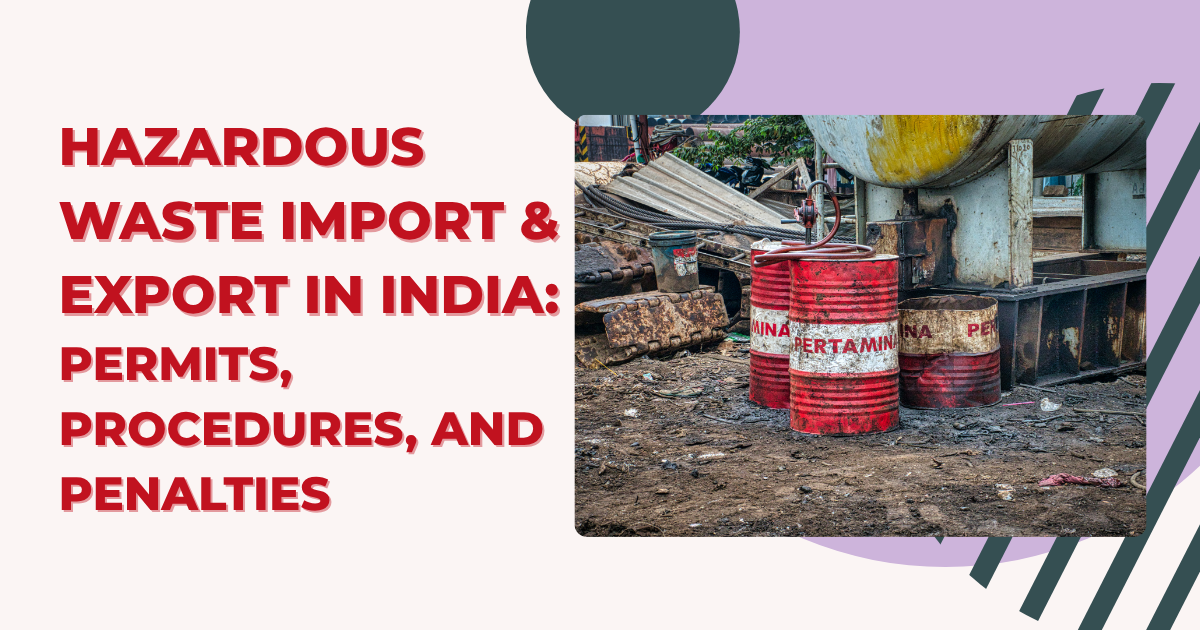Import of Hazardous Waste in India
The Environment (Protection) Act of 1986 established the Hazardous and Other Wastes (Management and Transboundary Movement) Rules of 2016, which regulate the import of hazardous waste in India. These guidelines require:
- The Ministry of Environment, Forests, and Climate Change (MoEFCC) has granted prior written consent.
- Compliance with the Basel Convention’s transboundary movement rules.
- Use of Form 6 and Form 7 (Movement Document) for shipping hazardous waste across borders.
- Only authorized recyclers and re-processors with valid Pollution Control Board consent can import hazardous waste for recycling/reuse.
Key prohibited imports: Hazardous waste for disposal (landfilling) is banned; only waste for resource recovery/recycling is allowed under strict conditions.
Hazardous Waste Management's Significance
The significance of hazardous waste management cannot be overstated. Effective management:
✔️ Prevents contamination of soil, water, and air.
✔️ Reduces risks to human health from exposure to toxic substances.
✔️ Conserves natural resources through recycling and recovery.
✔️ Ensures compliance with national and international environmental agreements.
✔️ Protects companies from hefty fines and reputational damage.
Every year, India produces more than 7 million tons of hazardous garbage, which can have catastrophic ecological and societal repercussions if improperly managed.
Talk about any four of the hazardous waste's key characteristics.
According to Schedule I of the Hazardous Waste Rules, hazardous waste exhibits one or more of these important characteristics:
Ignitability: Wastes that easily catch fire, e.g., solvents and certain chemicals.
Corrosivity: Acidic or alkaline wastes capable of corroding metals or destroying tissue.
Reactivity: Wastes prone to violent chemical reactions, explosions, or toxic gas release.
Toxicity: Wastes containing harmful substances that can cause severe health issues on exposure or leaching into groundwater.
Recognizing these characteristics is crucial for safe handling, storage, transport, and disposal.
Form-10 Records of Hazardous Wastes Imported and Exported
Form-10 records of hazardous wastes imported and exported are mandatory under Indian rules. Every importer or exporter of hazardous waste must:
- Maintain accurate records in Form-10.
- Submit annual returns to the State Pollution Control Board (SPCB) by June 30 of every year.
- Include details such as quantity, type of waste, origin/destination country, consignee information, and mode of transport.
- Retain these records for at least five years for inspection by regulatory authorities.
- Failure to maintain Form-10 records can lead to suspension of import/export permissions and significant penalties.
Final Words
India’s hazardous waste regulations are designed to strike a balance between economic activity and environmental safety. Businesses involved in the import of hazardous waste in India must understand the importance of hazardous waste management, identify key characteristics of hazardous waste, and diligently maintain Form-10 records of hazardous waste imported and exported.

Comments